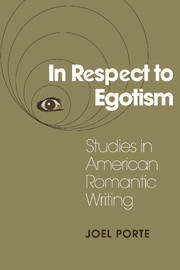Book contents
- Frontmatter
- Contents
- Preface
- Acknowledgments
- In Respect to Egotism
- Introduction: Writing, Reading, Romanticism
- 1 “Where … Is This Singular Career to Terminate?”: Bewildered Pilgrims in Early American Fiction
- 2 “Where There Is No Vision, the People Perish.…”: Prophets and Pariahs in the Forest of the New World
- 3 Poe: Romantic Center, Critical Margin
- 4 Emerson: Experiments in Self-Creation
- 5 Hawthorne: “The Obscurest Man of Letters in America”
- 6 Thoreau's Self-Perpetuating Artifacts
- 7 Melville: Romantic Cock-and-Bull; or, The Great Art of Telling the Truth
- 8 Douglass and Stowe: Scriptures of the Redeemed Self
- 9 Whitman: “Take Me as I Am or Not at All.…”
- Interchapter: Walt and Emily
- 10 Dickinson's “Celestial Vail”: Snowbound in Self-Consciousness
- Notes
- Index
- CAMBRIDGE STUDIES IN AMERICAN LITERATURE AND CULTURE
7 - Melville: Romantic Cock-and-Bull; or, The Great Art of Telling the Truth
Published online by Cambridge University Press: 24 March 2010
- Frontmatter
- Contents
- Preface
- Acknowledgments
- In Respect to Egotism
- Introduction: Writing, Reading, Romanticism
- 1 “Where … Is This Singular Career to Terminate?”: Bewildered Pilgrims in Early American Fiction
- 2 “Where There Is No Vision, the People Perish.…”: Prophets and Pariahs in the Forest of the New World
- 3 Poe: Romantic Center, Critical Margin
- 4 Emerson: Experiments in Self-Creation
- 5 Hawthorne: “The Obscurest Man of Letters in America”
- 6 Thoreau's Self-Perpetuating Artifacts
- 7 Melville: Romantic Cock-and-Bull; or, The Great Art of Telling the Truth
- 8 Douglass and Stowe: Scriptures of the Redeemed Self
- 9 Whitman: “Take Me as I Am or Not at All.…”
- Interchapter: Walt and Emily
- 10 Dickinson's “Celestial Vail”: Snowbound in Self-Consciousness
- Notes
- Index
- CAMBRIDGE STUDIES IN AMERICAN LITERATURE AND CULTURE
Summary
Chapter 99 of Moby-Dick, “The Doubloon.” Ahab is pacing his quarterdeck, as always, and stops to meditate on the sixteen-dollar gold piece that he has nailed to the mainmast as “the White Whale's talisman” and reward to whosoever raises Moby-Dick. Ahab, of course, will collect his own reward, since he is the one fated to discover the preternatural creature he has effectively conjured up, but now he pauses, before the payoff, to read his horoscope in this “equatorial coin” with its three Andes summits, tower, “crowing cock,” and cabalistic zodiac:
“There's something ever egotistical in mountain-tops and towers, and all other grand and lofty things; look here, – three peaks as proud as Lucifer. The firm tower, that is Ahab; the volcano, that is Ahab, the courageous, the undaunted, and victorious fowl, that, too, is Ahab; all are Ahab; and this round gold is but the image of the rounder globe, which, like a magician's glass, to each and every man in turn but mirrors back his own mysterious self … [T]his coined sun wears a ruddy face; but see! aye, he enters the sign of storms, the equinox! and but six months before he wheeled out of a former equinox at Aries! From storm to storm! So be it, then. Born in throes, 'tis fit that man should live in pains and die in pangs! So be it, then! Here's stout stuff for woe to work on. So be it, then.”
As has often been observed, Ahab's reading of the coin is narcissistic or solipsistic – the Emersonian “noble doubt” run wild.
- Type
- Chapter
- Information
- In Respect to EgotismStudies in American Romantic Writing, pp. 189 - 212Publisher: Cambridge University PressPrint publication year: 1991

